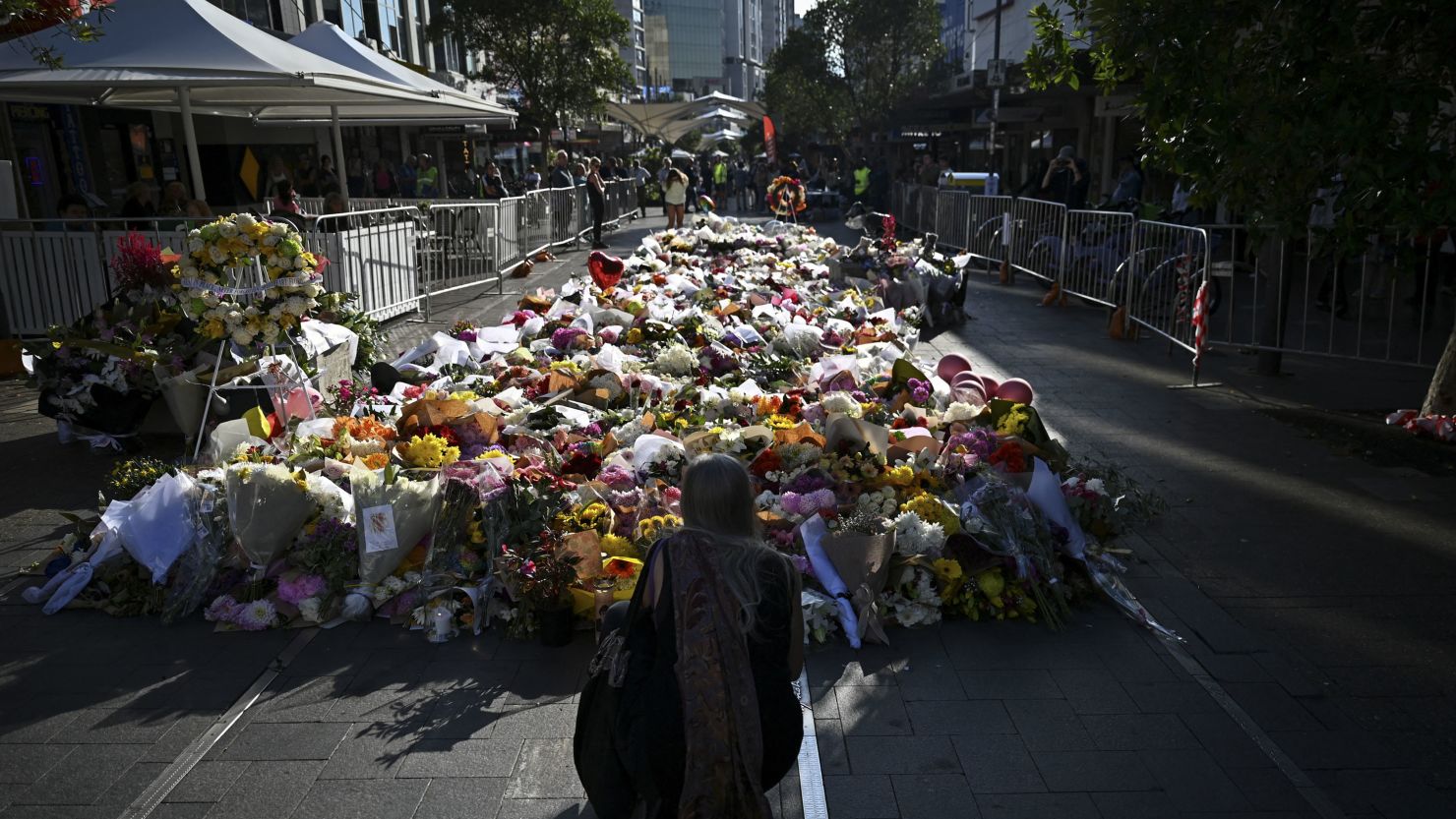Editor’s Note: Latika Bourke is an Australian author and journalist based in the UK. She is the former international reporter for the Sydney Morning Herald and The Age. Her book, “From India with Love,” was published in 2015. The views expressed in this commentary are her own. Read more CNN Opinion.
When news broke of a stabbing, and mass killing, at a Sydney shopping mall in which a baby was attacked, right-wing commentators overseas were quick to falsely diagnose the motive.

“Another day. Another terror attack by another Islamist terrorist. Six dead, others seriously injured, including a baby,” tweeted the British right-wing commentator Julia Hartley-Brewer.
But Hartley-Brewer was wrong. And she later acknowledged the post was incorrect.
The motive was not Islamist but an everyday threat for women: gendered violence.
It was “obvious” said the New South Wales Police Commissioner Karen Webb, that now-deceased attacker Joel Cauchi, a diagnosed schizophrenic according to his family, had a specific kind of victim in mind when he entered the beach suburb of Bondi’s busy Westfield shopping center on Saturday.
“The videos (of the attack) speak for themselves don’t they?” Webb told the Australian Broadcasting Corporation (ABC).
“It’s obvious to me, it’s obvious to detectives, that that seems to be an area of interest, that the offender had focussed on women and avoided the men.
“Five of the (six) deceased are women and the majority of victims in hospital are also women,” she said.
Webb added that police didn’t know what was in the mind of Cauchi when he launched his attack.
Detectives will certainly be trawling through his online activity to see if he belonged to any hate groups that operate in the darkest corners of the web.

Cauchi’s father Andrew Cauchi — who appeared devastated — believes his “monster” son may have deliberately set out to kill women, he told Australian media.
“Because he wanted a girlfriend, and he has no social skills, and he was frustrated out of his brain,” added the visibly distraught father.
Like Cauchi’s father, the nation is also traumatised. Multiple people, including a new mother, slaughtered in daylight in an affluent suburb is something Australians read about in the news when it happens in other countries.
Rarely does it occur in their backyard. When it did in 1996 after the Port Arthur Massacre when a lone gunman killed 35 people, then-prime minister John Howard, a Conservative leader, acted - with bipartisan support that has remained rock solid ever since.
He enacted strict gun control laws and initiated a massive buyback scheme. He had to stare down political opposition from his own supporters at the time, but his tough stance has been vindicated by the lack of mass shootings ever since.
But restricting public access to weapons with the capability of mass lethality cannot stop hateful ideologies mixing with other noxious ingredients including radicalization and mental health issues.
This includes misogyny.
Australian women live with some of the most sexist attitudes in the world, according to research presented to the London-based Global Institute for Women’s Leadership, chaired by Australia’s former and only female prime minister, Julia Gillard.
According to Our Watch, Australia’s leading national violence prevention organisation which provided me with the following statistics, two in five women have experienced violence since the age of 15, but it is far more likely — 35% versus 11% — to be at the hands of someone they know, rather than a complete stranger.
This is partly why the Bondi attack was so shocking.
Our Watch CEO Patty Kinnersly told me that while the motivating factors in Saturday’s attack were complex and still not determined, the case showed why addressing sexist attitudes was critical to women’s safety.
“While we cannot speak directly about the causes or motives for this specific incident, we know that more broadly, evidence does not point to mental illness being a driver of violence against women,” she said.
“The evidence consistently shows that the underlying causes of violence directed toward women are rigid gender stereotypes, sexism and disrespect.
“The sad reality is that when men hold unequal and sexist views about women, women are not safe.”
The city was rocked again by a second and shockingly violent attack on Monday night, when a teenager stabbed worshippers, including Bishop Mar Mari Emmanuel giving mass at the Assyrian Orthodox Christ The Good Shepherd Church.
Unlike Cauchi’s deadly rampage, the church attack was declared a terrorist act.
Roman Quaedvlieg, who worked in Australian law enforcement for decades, including on counterterrorism, told me the motivations behind the types of attacks witnessed in Sydney in the space of just a few days were often driven by a complex set of factors.
“These can be rooted in deep-seated emotional or psychological causes and are often accompanied by mental ill-health, and/or substance abuse,” he said.
“Lone actor terrorists in non-conflict areas like Australia usually are young males with emotional or psychological vulnerabilities, who are often social misfits as a result of those vulnerabilities,” he added.

Quaedvlieg said technology meant that the path to radicalisation was so swift, it could go unnoticed.
“I do believe that the evolution of technology, online connectivity, and the proliferation of video images, particularly when they lionize violence, does inspire, embolden, normalise and instruct those who have a disposition to extremism and violence,” he said.
He added that the motivations for attacks didn’t need to be the same for them to inspire other radicals.
“Considering the attacks occurred in the same city, the short span of time between the attacks and the wide publicity dedicated to the Bondi Junction attack, it is possible that the Wakeley attacker was either motivated to seek similar notoriety, or the Bondi Junction attack gave him confidence to act on an intent he had previously harboured,” he said.
But one commonality between the two males was their history with knives.
Joel Cauchi had a fixation with blades and kept a collection of them, his father told the newspaper The Australian.
And the 16-year-old boy arrested for the church attack was charged with possessing a knife, in November last year, according to the ABC.
The ABC also reported that the boy used a switchblade, an illegal weapon in Australia. His attack inside the church did not kill anyone.
Imagine if they’d been obsessed with guns.
If he had been living in the United States, might Cauchi have been able to slaughter many many more women because of that country’s much easier access to assault rifle-style semi-automatic firearms?
Because of technology, the ability for self-radicalization — whatever the combination of motivating factors — is speedier now than in the days when Howard had the foresight to ban weapons capable of causing mass casualties in seconds.
Australia is rocked by the tragedy. Mums and Dads will be holding their children a little tighter this week.
The twin attacks are horrifying, distressing and shocking but partly why it is so especially shocking is that unlike the US where mass shootings sadly never feel out of the headlines for long, violence in Australia at the scale witnessed these past few days has been rare.



